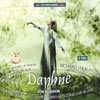Strauss Daphne
June Anderson’s tree-girl doesn’t quite manage to blossom
View record and artist detailsRecord and Artist Details
Composer or Director: Richard Strauss
Genre:
Opera
Label: Dynamic
Magazine Review Date: 3/2006
Media Format: CD or Download
Media Runtime: 104
Mastering:
Stereo
DDD
Catalogue Number: CDS499/1-2

Tracks:
| Composition | Artist Credit |
|---|---|
| Daphne |
Richard Strauss, Composer
Birgit Remmert, Gaea Daniel Lewis Williams, Peneios, Bass Dominik Eberle, Shepherd I Dorothee Wiedmann, Maiden II Emanuele Pedrini, Shepherd IV Giuseppe Accolla, Shepherd III June Anderson, Daphne, Soprano Liesl Odenweller, Maiden I, Soprano Richard Strauss, Composer Roberto Saccà, Leukippos, Tenor Scott MacAllister, Apollo, Tenor Stefan Anton Reck, Conductor Stefano Ferrari, Shepherd II, Tenor Venice La Fenice Chorus Venice La Fenice Orchestra |
Author: Mike Ashman
This human and surprisingly modern reworking of the myth of girl turned into laurel tree is Strauss’s Parsifal, a late masterwork of orchestral and dramatic subtleties that revisits with interest much earlier territory (the exalted violence of Elektra, the welter of descriptive colour of Die Frau ohne Schatten) without once sounding stale or note-spun. Joseph Gregor’s much-attacked libretto may lack the professional poetry of a Hofmannsthal or a Zweig but its very lacunae gave Strauss an opportunity to paint character and situation in a detail previously impossible for him.
In other circumstances Daphne would have been a good candidate for Dynamic’s tour round the byways of Romantic opera but a combination of CD archaeology and increasing stage interest have now taken the number of recordings up to a fiercely competitive seven. As he did with Lulu (Oehms, 1/04), Stefan Anton Reck imbues his Italian players with a real grasp of German colour and style (there is much lovely if forwardly recorded woodwind detail) but a hundred-plus uninterrupted minutes of virtuoso writing tests orchestral concentration (and lips) to the limit.
Onstage, June Anderson, in a crossover from her normal Italian and French pyrotechnics, is most effective when fully warmed-up in the big duet with Apollo. The long (and lower) opening monologue ‘O bleib, geliebter Tag’ does not lie well for her and in her final tree-ification she sounds tired. The diamond-cut clarity of her technique and the fearless top notes are offset by a lack of warmth and textual colouring and of unanimity with Reck’s tempi.
McAllister and Saccà, her tenor would-be lovers, both produce well thought-out vocal characters. They lack the sheer heroic sexuality of DG’s James King or Fritz Wunderlich, or Decca’s Johan Botha. Birgit Remmert brings much energy to the hair-raisingly low-lying role of Gaea. Reck follows the Böhm cuts in ‘Unheilvolle Daphne’ and ‘Götter! Brüder im hohen Olympos’.
Dynamic’s recording is very ‘live’, lots of noise, an adequate stage/pit balance but some telescoping of orchestral detail. No one would come away from this performance in the theatre untouched but on record it does not match the authentic rush of Böhm and his three principals for DG, the orchestral detail of the new Bychkov (with exciting work from Fleming and Botha) or the more fluent and experienced assumptions of the leading role by Hilde Gueden, Maria Reining or Lucia Popp (in an EMI set – 11/89, nla – where Haitink’s cooler traversal of the score has many advantages).
In other circumstances Daphne would have been a good candidate for Dynamic’s tour round the byways of Romantic opera but a combination of CD archaeology and increasing stage interest have now taken the number of recordings up to a fiercely competitive seven. As he did with Lulu (Oehms, 1/04), Stefan Anton Reck imbues his Italian players with a real grasp of German colour and style (there is much lovely if forwardly recorded woodwind detail) but a hundred-plus uninterrupted minutes of virtuoso writing tests orchestral concentration (and lips) to the limit.
Onstage, June Anderson, in a crossover from her normal Italian and French pyrotechnics, is most effective when fully warmed-up in the big duet with Apollo. The long (and lower) opening monologue ‘O bleib, geliebter Tag’ does not lie well for her and in her final tree-ification she sounds tired. The diamond-cut clarity of her technique and the fearless top notes are offset by a lack of warmth and textual colouring and of unanimity with Reck’s tempi.
McAllister and Saccà, her tenor would-be lovers, both produce well thought-out vocal characters. They lack the sheer heroic sexuality of DG’s James King or Fritz Wunderlich, or Decca’s Johan Botha. Birgit Remmert brings much energy to the hair-raisingly low-lying role of Gaea. Reck follows the Böhm cuts in ‘Unheilvolle Daphne’ and ‘Götter! Brüder im hohen Olympos’.
Dynamic’s recording is very ‘live’, lots of noise, an adequate stage/pit balance but some telescoping of orchestral detail. No one would come away from this performance in the theatre untouched but on record it does not match the authentic rush of Böhm and his three principals for DG, the orchestral detail of the new Bychkov (with exciting work from Fleming and Botha) or the more fluent and experienced assumptions of the leading role by Hilde Gueden, Maria Reining or Lucia Popp (in an EMI set – 11/89, nla – where Haitink’s cooler traversal of the score has many advantages).
Discover the world's largest classical music catalogue with Presto Music.

Gramophone Digital Club
- Digital Edition
- Digital Archive
- Reviews Database
- Full website access
From £8.75 / month
Subscribe
Gramophone Full Club
- Print Edition
- Digital Edition
- Digital Archive
- Reviews Database
- Full website access
From £11.00 / month
Subscribe
If you are a library, university or other organisation that would be interested in an institutional subscription to Gramophone please click here for further information.




